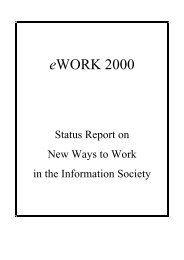Proceedings of 8th European Assembly on telework (Telework2001)
Proceedings of 8th European Assembly on telework (Telework2001)
Proceedings of 8th European Assembly on telework (Telework2001)
You also want an ePaper? Increase the reach of your titles
YUMPU automatically turns print PDFs into web optimized ePapers that Google loves.
223Short summaries <str<strong>on</strong>g>of</str<strong>on</strong>g> the other presentati<strong>on</strong>s in the sessi<strong>on</strong>Local dimensi<strong>on</strong>s <str<strong>on</strong>g>of</str<strong>on</strong>g> the knowledge ec<strong>on</strong>omyJeremy Millard, Danish Technological Institute, DenmarkJeremy Millard (Danish Technological Institute, Denmark) explained how the digital, knowledgeor e-ec<strong>on</strong>omy is dramatically changing the envir<strong>on</strong>ment in which businesses operate and individualsdo their work. New informati<strong>on</strong> and communicati<strong>on</strong> technology (ICT) is no l<strong>on</strong>ger simply a toolto do existing things faster, cheaper or better. ICT is in many ways redefining the socio-ec<strong>on</strong>omic,geographical and political landscape by posing new threats, providing new opportunities, changingrelati<strong>on</strong>ships and opening new ways <str<strong>on</strong>g>of</str<strong>on</strong>g> doing things and producing new types <str<strong>on</strong>g>of</str<strong>on</strong>g> goods andservices. However, the resp<strong>on</strong>se to these changes and challenges in Europe varies tremendouslyfrom place to place, and it seems that the majority <str<strong>on</strong>g>of</str<strong>on</strong>g> rural and peripheral areas <str<strong>on</strong>g>of</str<strong>on</strong>g>ten lose out,despite the fact they now have the opportunity to c<strong>on</strong>nect with the rest <str<strong>on</strong>g>of</str<strong>on</strong>g> the world over electr<strong>on</strong>icnetworks.The presentati<strong>on</strong> attempted to give a synoptic view <str<strong>on</strong>g>of</str<strong>on</strong>g> problems and possibilities, and examinedwhat is really going <strong>on</strong>. To what extent can work become de-localised and provide newopportunities to support the social and ec<strong>on</strong>omic development <str<strong>on</strong>g>of</str<strong>on</strong>g> remote and rural areas in Europe?Which regi<strong>on</strong>al development strategies are appropriate in linking remote and core areas, and whatpotential do eWork and flexible working have to enhance community life? Evidence was presentedto show that <strong>telework</strong> is largely an urban phenomen<strong>on</strong> employed by large organisati<strong>on</strong>s. So, theoverall evidence from rural and peripheral areas seems not to be encouraging and the prospectsunclear. On the other hand, the evidence we have is historical and does not necessarily predictthe future with accuracy. Similarly, there are a large number <str<strong>on</strong>g>of</str<strong>on</strong>g> cases which do show highlysuccessful initiatives in creating new jobs in these such areas. What is therefore needed is a clearunderstanding <str<strong>on</strong>g>of</str<strong>on</strong>g> the basis for success and an analysis <str<strong>on</strong>g>of</str<strong>on</strong>g> how and in what circumstances this can bereplicated elsewhere. Regi<strong>on</strong>al disadvantage in the knowledge ec<strong>on</strong>omy is just as much a centralc<strong>on</strong>cern in discussi<strong>on</strong>s about the so-called digital divide as are skills, gender, income and otheraspects. The c<strong>on</strong>clusi<strong>on</strong>s <str<strong>on</strong>g>of</str<strong>on</strong>g> this presentati<strong>on</strong> are incorporated into the overall less<strong>on</strong>s from thesessi<strong>on</strong> given at the end <str<strong>on</strong>g>of</str<strong>on</strong>g> this report.Seppo Peltola (Ministry <str<strong>on</strong>g>of</str<strong>on</strong>g> Interior, Finland) presented a very Finnish approach to bolstering thee-activities <str<strong>on</strong>g>of</str<strong>on</strong>g> local and regi<strong>on</strong>al areas through the establishment <str<strong>on</strong>g>of</str<strong>on</strong>g> local portals. Finland has beenalmost unique in developed countries in retaining local m<strong>on</strong>opoly telecom companies based <strong>on</strong>local cooperati<strong>on</strong> and ownership. Free competiti<strong>on</strong> was, however, also introduced in 1996 in orderto support the development <str<strong>on</strong>g>of</str<strong>on</strong>g> new informati<strong>on</strong> networks. These platforms are now being used tosupport 50 initiatives to build local informati<strong>on</strong> networks and services, each geared to the uniquespecific characteristics and needs found in different places. These local/regi<strong>on</strong>al portals typicallycover an area <str<strong>on</strong>g>of</str<strong>on</strong>g> up about 30 km radius based up<strong>on</strong>:








